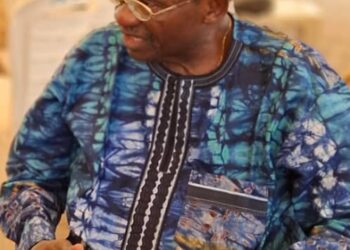By Stanley Chukwuemeka Okereafor and Mercy Tartsea-Anshase, PhD. Bingham University, Karu, Nigeria.
Jamandu visits the popular Wuse market, not to shop, like the many thousands of shoppers flocking the ever bustling Abuja market, but to observe human behaviour.
Like many of us are wont to do, albeit unconsciously, he is people watching. Some Sociologists argue that “we enjoy observing people in public without their knowledge…it is something we all do…”
Jamandu observes that at the market entrance, while some motorists gladly pay the entry or parking fee, others flash some plastic cards, presumably some identification that should give them a waiver or free pass into the market.
Many of those bearing these plastic IDs are let in, while some exchange hot words with the security at the gate, with screams of ‘do you know who I am? I will deal with you’ by the supposed shoppers. On closer examination, Jamadu notes that the bearers of the plastic cards are majorly security operatives and others with diplomatic passes. Since he strolled to the market, Jamandu would neither need to pay nor flash any ID to come into the market.
While at the market car park he observes that some free parking spaces are blocked with tyres by the parking attendants, who only open up the spaces to drivers who “see” them.
Ironically, the parking attendants may see you, but you also have to ‘see’ them, it must be mutual. To ‘see’ the attendants meant you may have to part with some extra money, if you were not recognised as a shop owner or a previously benevolent shopper.
Sadly paying the parking fee does not guarantee prime parking space, and sometimes does not guarantee any parking space at that.
Jamandu mused at all the drama he has witnessed between the gate and the parking area and was sure that more drama was waiting further inside the market.
As he walked further into the market, different hawkers accost him with different wares, with mouth-watering offers and promises.
Beggars also accost him, praying for his unborn generation and hoping he would “shake body”. He “shakes body” by parting with a few naira to a group of beggars and receives more heartfelt prayers.
The beggars chuckle among themselves saying what a good and generous man he is.
Jamandu notices that many of the hawkers who accosted him earlier were impatient with any prospective customer they thought was slow to respond to their business proposal of buying their wares.
These hawkers were quick to move to the next prospect and try their luck.
There are many shops selling different goods and offering various services that Jamandu is lost for choice.
Some owners call out to him as he walks past. He decides to visit a jewellery shop. He is warmly received. He makes some enquires and leaves.
He then proceeds to a clothing shop, and also experiences the same warm reception, and indeed other shops he visited.
Jamandu wonders why this warm reception is not universal among all the sellers. He concludes that perhaps the shop owners are more welcoming than the hawkers he encountered as he entered the market.
The shop owners have more at stake in the market than the hawkers it would seem. Jamandu walks up to a hawker selling cold drinks.
On enquiry, she claims the drinks are chilled. He requests for a plastic bottle of a popular brand.
He is disappointed when the hawker hands over the drink to him. It is not cold. Just beside the hawker is also a pile of improperly disposed water sachets popularly called pure water.
A huge refuse is beginning to form there, and no one seems to care. Jamandu begins his walk back to the gate on his way home.
He is not particularly excited about all the things he experienced today at the market.
In many of the happenings in the above story, we see everyday culture at play, which also have become popular culture in many instances.
Anyone who has lived in this environment for a bit will be familiar with the parlance, ‘do you know who I am?’ or better still ‘I will deal with you’. In many heated arguments, you are almost guaranteed to hear the combatants threaten as such.
Also, there is hardly any Nigerian city where there are no beggars, in large numbers in some cities.
Begging has become so pervasive that one may bother at no sight of beggars at traffic stops or popular spots.
Begging and attempts to abuse office have become so popular a culture, on the wrong side sadly.
Defined as “culture based on the tastes of ordinary people rather than an educated elite”, popular culture permeates our everyday lives and activities.
Popular culture, also called pop culture or mass culture, like everyday culture is ordinary.
However, the seeming, ordinariness of everyday and popular culture should not be construed as making them irrelevant.
In fact some scholars argue that “the ubiquity of everyday culture means that it affects all aspects of contemporary economic, social, and political life.”
Everyday culture, which sometimes translates to popular culture maybe critical in determining the socio-political and economic development of a nation, hence should not be ignored.
Popular culture is all around us, without our knowledge, and many times sets the tone in fashion, social etiquette, food, music and trends.
The ordinariness of popular culture and everyday culture has many potentials and possibilities.
A nation with a popular culture of hard work, keeping to time and honesty would do better than one without.
Popular culture is shared among communities and groups. This shared understanding can be useful and important in community and social mobilisation and action.
More emphasis should be placed in studying Nigeria’s popular culture with a view of utilising them in re-engineering socio-political and cultural trends.
For example, there is a general belief that ‘Japanese don’t leave trash behind’. The Japanese always endeavour to leave a clean environment.
This did not happen overnight. It was a calculated and deliberate plan of action by the leadership of Japan, some say after the devastation of the World War.
Japanese children and adults alike are indoctrinated on the benefits of a clean environment, and everyone endeavours to contribute their quota to achieve that.
This has made Japanese cities among the cleanest in the world. This has ripple effects on this Asian nation. Clean cities mean less environmental degradation and less pollution.
It also means more recycling and more energy saving which all invariably lead to better living condition for citizens.
Nigeria has a lot to learn from this. A culture of irresponsible refuse disposal, lateness, dishonesty, and apathy towards facilities maintenance can only further spell doom for a nation grappling with major socio-political and economic crises.
Nigeria needs to deliberately develop and harness popular culture and utilise them for national development.
*The authors can be reached via email:
Stanley Chukwuemeka Okereafor: scokereafor@gmail.com
Mercy Tartsea-Anashase, PhD: mamet4u@gamil.com*



















